英语口语中缩读词的读法
- 格式:doc
- 大小:71.00 KB
- 文档页数:12
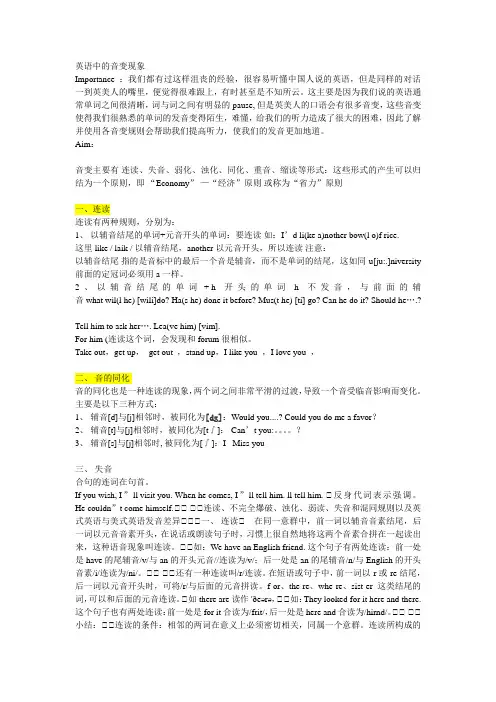
英语中的音变现象Importance :我们都有过这样沮丧的经验,很容易听懂中国人说的英语,但是同样的对话一到英美人的嘴里,便觉得很难跟上,有时甚至是不知所云。
这主要是因为我们说的英语通常单词之间很清晰,词与词之间有明显的pause, 但是英美人的口语会有很多音变,这些音变使得我们很熟悉的单词的发音变得陌生,难懂,给我们的听力造成了很大的困难,因此了解并使用各音变规则会帮助我们提高听力,使我们的发音更加地道。
Aim:音变主要有连读、失音、弱化、浊化、同化、重音、缩读等形式:这些形式的产生可以归结为一个原则,即“Economy”—“经济”原则或称为“省力”原则一、连读连读有两种规则,分别为:1、以辅音结尾的单词+元音开头的单词:要连读如:I’d li(ke a)nother bow(l o)f rice.这里like / laik / 以辅音结尾,another 以元音开头,所以连读注意:以辅音结尾指的是音标中的最后一个音是辅音,而不是单词的结尾,这如同u[ju:.]niversity 前面的定冠词必须用a 一样。
2、以辅音结尾的单词 + h开头的单词h不发音,与前面的辅音 what wil(l he) [wili]do? Ha(s he) done it before? Mus(t he) [ti] go? Can he do it? Should he….?Tell him to ask her…. Lea(ve him) [vim].For him (连读这个词,会发现和forum 很相似。
Take out,get up,get out ,stand up,I like you ,I love you ,二、音的同化音的同化也是一种连读的现象,两个词之间非常平滑的过渡,导致一个音受临音影响而变化。
主要是以下三种方式:1、辅音[d]与[j]相邻时,被同化为[dʒ]:Would you....? Could you do me a favor?2、辅音[t]与[j]相邻时,被同化为[t∫]: Can’t you:。
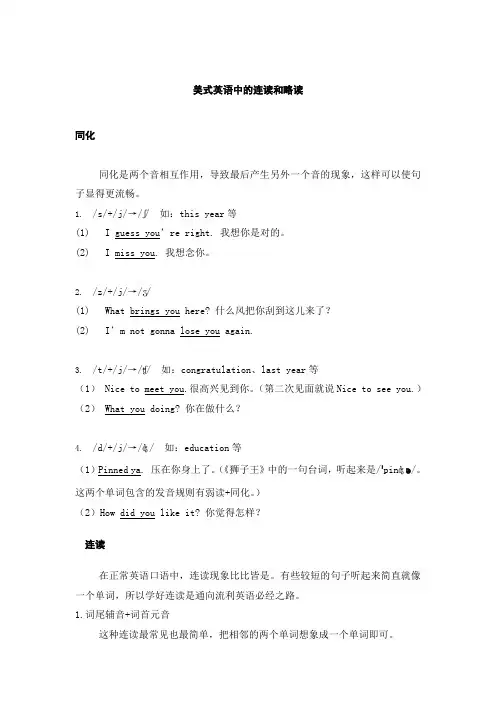
美式英语中的连读和略读同化同化是两个音相互作用,导致最后产生另外一个音的现象,这样可以使句子显得更流畅。
1./s/+/j/→/ʃ/ 如:this year等(1)I guess you’re right. 我想你是对的。
(2)I miss you. 我想念你。
2./z/+/j/→/ʒ/(1)What brings you here? 什么风把你刮到这儿来了?(2)I’m not gonna lose you again.3./t/+/j/→/ʧ/ 如:congratulation、last year等(1) Nice to meet you.很高兴见到你。
(第二次见面就说Nice to see you.)(2) What you doing? 你在做什么?4./d/+/j/→/ʤ/ 如:education等(1)Pinned ya. 压在你身上了。
(《狮子王》中的一句台词,听起来是/ˈpinʤə/。
这两个单词包含的发音规则有弱读+同化。
)(2)How did you like it? 你觉得怎样?连读在正常英语口语中,连读现象比比皆是。
有些较短的句子听起来简直就像一个单词,所以学好连读是通向流利英语必经之路。
1.词尾辅音+词首元音这种连读最常见也最简单,把相邻的两个单词想象成一个单词即可。
(1) I’m so fed up with him. 他让我烦透了。
(2) I’ve already made up my mind. 我意已决。
(3) That is so gross [ɡrəus].太俗了。
(4) Turn on the juice. 合上开关,恢复通电。
(juice也有电的意思)2.词尾元音+词首元音A:以/u/、/ʊ/、/au/、/o/结尾的单词与跟在后面的元音连读时,两个元音之间加上一个较轻的/w/,这样过渡就会很自然。
(1) Just do it. 尽管去做吧!(2) It’s snowing. 下雪了。

为什么听不懂老外的发音——原来英语有连读、弱读和缩读连读(一)什么是连读。
在连贯地说话或朗读时,在同一个意群(即短语或从句)中,如果相邻的两个词前者以辅音音素结尾,后者以元音音素开头,就要自然地将辅音和元音相拼,构成一个音节,这就是连读。
连读时的音节一般不重读,只需顺其自然地一带而过,不可以加音,也不可以读得太重。
如:notatall这个短语。
连读时听起来就像是一个单词。
注意:连读只发生在句子中的同一个意群中。
在两个意群之间即使有两个相邻的辅音和元音出现,也不可连读。
如:Pleasetakealookatit.这个句子中takealookatit是同一个意群,那么take与a可连读,look与at可连读,at与it可连读。
在Thereisabookinit.一句中book与in往往不连读,因为book与in分别在两个不同的意群中。
(二)连读的详细情况1.在同一个意群中,相邻的两个词,前者以辅音音素结尾,后者以元音音素开头,往往要拼在一起连读。
如:He is a student.(is与a要连读)That is a right answer.(That与is,is和a,right和answer都可以连读)I’ll beback in half an hour.(back和in,half和an,an与hour都可以连读)。
2.在同一个意群中的两个单词,如果前面的单词以r或re结尾,后面的单词以元音音素开头,则r或re要发/r/音,并与其后的元音音素相拼。
如:hereandthere连读时往往读作/。
hiErEnd`TZE/。
apairofshoes连读时读作/E`pZErEv`FU:z/.(三)音的组合任何一个单词都是由音素的不同组合而成。
英语中,同一音节中两个或两个以上相邻的辅音结合在一起,这种结构叫做辅音群(或辅音连缀、辅音丛)。
两个、三个辅音的连缀,在英语中是普遍的。
像sixths/siksz/这样四个辅音的连缀却比较少。
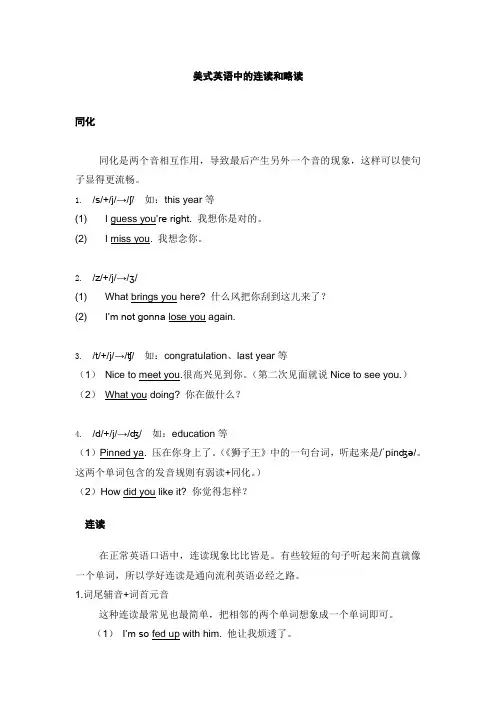
美式英语中的连读和略读同化同化是两个音相互作用,导致最后产生另外一个音的现象,这样可以使句子显得更流畅。
1./s/+/j/→/ʃ/ 如:this year等(1) I guess you’re right. 我想你是对的。
(2) I miss you. 我想念你。
2./z/+/j/→/ʒ/(1) What brings you here? 什么风把你刮到这儿来了?(2) I’m not gonna lose you again.3./t/+/j/→/ʧ/ 如:congratulation、last year等(1)Nice to meet you.很高兴见到你。
(第二次见面就说Nice to see you.)(2)What you doing? 你在做什么?4./d/+/j/→/ʤ/ 如:education等(1)Pinned ya. 压在你身上了。
(《狮子王》中的一句台词,听起来是/ˈpinʤə/。
这两个单词包含的发音规则有弱读+同化。
)(2)How did you like it? 你觉得怎样?连读在正常英语口语中,连读现象比比皆是。
有些较短的句子听起来简直就像一个单词,所以学好连读是通向流利英语必经之路。
1.词尾辅音+词首元音这种连读最常见也最简单,把相邻的两个单词想象成一个单词即可。
(1)I’m so fed up with him. 他让我烦透了。
(2)I’ve already made up my mind. 我意已决。
(3)That is so gross [ɡrəus].太俗了。
(4)Turn on the juice. 合上开关,恢复通电。
(juice也有电的意思)2.词尾元音+词首元音A:以/u/、/ʊ/、/au/、/o/结尾的单词与跟在后面的元音连读时,两个元音之间加上一个较轻的/w/,这样过渡就会很自然。
(1)Just do it. 尽管去做吧!(2)It’s snowing. 下雪了。
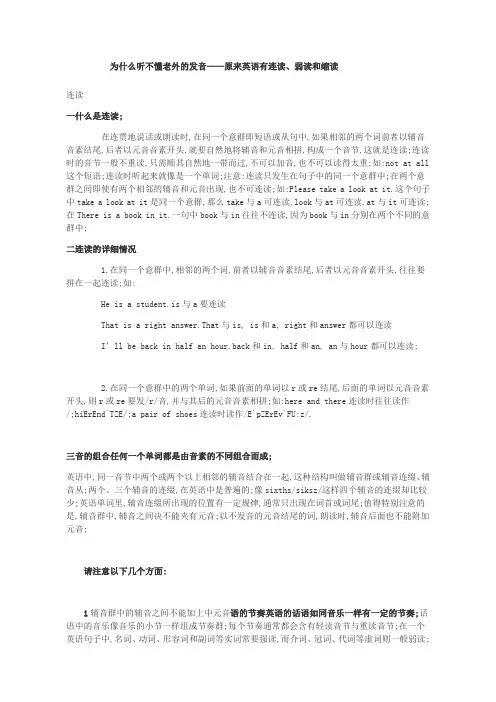
为什么听不懂老外的发音——原来英语有连读、弱读和缩读连读一什么是连读;在连贯地说话或朗读时,在同一个意群即短语或从句中,如果相邻的两个词前者以辅音音素结尾,后者以元音音素开头,就要自然地将辅音和元音相拼,构成一个音节,这就是连读;连读时的音节一般不重读,只需顺其自然地一带而过,不可以加音,也不可以读得太重;如:not at all 这个短语;连读时听起来就像是一个单词;注意:连读只发生在句子中的同一个意群中;在两个意群之间即使有两个相邻的辅音和元音出现,也不可连读;如:Please take a look at it.这个句子中take a look at it是同一个意群,那么take与a可连读,look与at可连读,at与it可连读;在There is a book in it.一句中book与in往往不连读,因为book与in分别在两个不同的意群中;二连读的详细情况1.在同一个意群中,相邻的两个词,前者以辅音音素结尾,后者以元音音素开头,往往要拼在一起连读;如:He is a student.is与a要连读That is a right answer.That与is, is和a, right和answer都可以连读I’ll be back in half an hour.back和in, half和an, an与hour都可以连读;2.在同一个意群中的两个单词,如果前面的单词以r或re结尾,后面的单词以元音音素开头,则r或re要发/r/音,并与其后的元音音素相拼;如:here and there连读时往往读作/;hiErEnd`TZE/;a pair of shoes连读时读作/E`pZErEv`FU:z/.三音的组合任何一个单词都是由音素的不同组合而成;英语中,同一音节中两个或两个以上相邻的辅音结合在一起,这种结构叫做辅音群或辅音连缀、辅音丛;两个、三个辅音的连缀,在英语中是普遍的;像sixths/siksz/这样四个辅音的连缀却比较少;英语单词里,辅音连缀所出现的位置有一定规律,通常只出现在词首或词尾;值得特别注意的是,辅音群中,辅音之间决不能夹有元音;以不发音的元音结尾的词,朗读时,辅音后面也不能附加元音;请注意以下几个方面:1辅音群中的辅音之间不能加上中元音语的节奏英语的话语如同音乐一样有一定的节奏;话语中的音乐像音乐的小节一样组成节奏群;每个节奏通常都会含有轻读音节与重读音节;在一个英语句子中,名词、动词、形容词和副词等实词常要强读,而介词、冠词、代词等虚词则一般弱读;英语的节奏规律是重读音节与轻读音节的组合加重复来体现的;英语口语中的节奏基本体现在各个重读音节用“”来表示之间,其时距大体相同;英语是一种以重音计时的语言,各个重音与它跟随的若干轻读音节用“·”表示构成一个节奏群,有时一个节奏群是一个空拍“<”表示开始的空拍在英语中也叫做“silent stress”;节奏群用“/”来标识;我们用大致相同的时间来朗读每个节奏群;因此,为了真正取得节奏效果,碰到轻音少的节奏时,我们就可以念慢些,轻音较多的节奏群则必须念快一些;例如:daylight·/flashlight·.One/Two/Three/Four,/lets·/go/lets·/·younger·sister·/leftthe·bagat··the·/furnit·ure·.两个重音之间的轻读音节越多,我们在每个轻读音节上花的时间便越少;有时一个节奏群是以空拍开始,后面紧跟着几个轻音节,这样的节奏群常见句首或句子中需要停顿的地方;例如:He∧is·a·/student./Yes/Peter·,/he∧was·at·/home.五.弱读单词在句中可以强读,也可以弱读,主要取决于上下文所表达的意思;有些英语单词本身具有两种或两种以上不同发音;以单词some为例,该词在重读或单独出现时,其元音的发音与单词sum完全一样;但是,当some在句子中作为非重读单词时,其元音就显得短而模糊;弱读音节中最常见的音是中元音的连读在英语的实际运用中,人们常将属于同一意群的词连在一起,一口气说出来;意群中词与词之间不留空隙,这种读法叫“连读”用“”来表示;英语有三种连读形式:1辅音除了/r/、/w/和/j/元音:单词末尾的辅音同下一个以元音开头的单词连读;例如:readit/ri:dit/,brushup/brp/;在朗读这种连读时,可以采用这样的技巧:把前面词的末尾辅音移到后一个词的开头来读;如:putiton可读成/pu-ti-tn/;2元音元音:前一个词的末尾元音和后一个词的起首元音连在一起读出,使它们中间不出现停顿;如:doit/du-it/,heatesome/hietsm/,轻轻地滑到下一个元音上;3/r/ 元音:这一类连读分为词末连接音/r/和外加音/r/与元音的连读;a单词末尾或音节末尾的r在英式英语中是不发音的;但是,在连贯话语里,如果这个单词后面紧跟着一个以元音开头的词,而且两个词在意义上密切相关且中间无停顿隔开时,就可能是原来不发音的字母r读为/r/,并同后一个单词的元音字首相连;例如:thereis/riz/,forever/f:rev/;b为了避免让两个意义相关的比邻词的末首元音分立而读,我们通常在前一个词的结尾元音和后面单词的起首元音之间加上/r/音,这就是外加音/r/;如:idea of it/aidirvit/,the sofa over there/sufruv-/;七.语调我们说话时可以随意改变音高,使音调上升或下降;我们还可以像歌唱家那样突然抬高话语的音调;音调的这种上扬或下降叫语调;英语有两种基本的语调:升调和降调分别用符号“.”、“∈”表示;升降的过程可以是急促的,也可以是缓慢的,还可以形成不同的组合;说话人可以通过语调准确地表达各种信息;1升调:升调多用来表示“不肯定”和“未完结”的意思,比如一般疑问句,语气婉转的祈使句,以及用陈述句子形式表示疑问的各类句子;如:aShall I tell him to come and see have you got there用于特殊疑问句中,语气亲切热情d.Right you. are.用于某些感叹句中,表示轻快、活泼、鼓励等意义eShe bought. red,.yellow,and. green rugs.用于排例句中,区别语义2降调:降调表示“肯定”和“完结”;一般用于陈述句、特殊疑问句、命令句和感叹句中;例如:aSwimming is my favourite∈sport.用于陈述句表示肯定的意义bWhat did you find∈there降调用于特殊疑问句表示说话人浓厚的兴趣cTell me all about∈it.语气较强的命令dHave you got the∈tickets降调用于一般疑问句表示说话人的态度粗率、不耐烦或不高兴eHow∈nice用于感叹句,表示感叹英语中除了升调、降调这两种最基本的语调外,还有降—升调、升—降调、升—降—升调、平调等;我们掌握了基本的降升调后,可以查阅参考书,再增加这方面的知识连读的条件:相邻的两词在意义上必须密切相关,同属一个意群;连读所构成的音节一般都不重读,只需顺其自然地一带而过,不可读得太重,也不可音;连读符号:~ 1“辅音+元音”型连读在同一个意群里,如果相邻两词中的前一个词是以辅音结尾,后一个词是以元音开头,这就要将辅音与元音拼起来连读; I’m~an~English b oy. It~is~an~old book. Let me have~alook~at~it. Ms Black worked in~an~office last~yesterday. I called~youhalf~an~hour~ago. Put~it~on, please. Not~at~all. Please pick~it~up.2“r/re+元音”型连读如果前一个词是以-r或者-re结尾,后一个词是以元音开头,这时的r 或re不但要发/r/,而且还要与后面的元音拼起来连读; They’re my father~and mother.I looked for~it here~and there. There~is a football under~it. There~are some books on the desk. Here~is a letter for you. Here~are four~eggs. But where~is my cup Where~are your brother~and sister 但是,如果一个音节的前后都有字母r,即使后面的词以元音开头,也不能连读; The black clouds are coming nearer andnearer.nearer与and不可连读3“辅音+半元音”型连读英语语音中的/j/和/w/是半元音,如果前一个词是以辅音结尾,后一个词是以半元音,特别是/j/开头,此时也要连读;Thank~you. Nice to meet~you. Did~you get there late~again Would~you like~a cup~of tea Could~you help me, please “音的同化”—常把/d/+/j/读成/dV/,did you听上成了/dIdVu/,would you成了/wudVu/,could you成了/kudVu/; 4“元音+元音”型连读如果前一个词以元音结尾,后一个词以元音开头,这两个音往往也要自然而不间断地连读到一起; I~am Chinese. He~is very friendly to me. She wants to study~English. How~and why did you come here She can’t carry~it.It’ll take you three~hours to walk there. The question is too~easy for him to answer. 5当短语或从句之间按意群进行停顿时,意群与意群之间即使有两个相邻的辅音与元音出现,也不可连读; Is~it a~hat or a cathat与or之间不可以连读There~is~a good book in my desk. book与in 之间不可以连读Can you speak~English or French English与or之间不可以连读Shall we meet at~eight or ten tomorrow morning meet与 at,eight与or之间不可以连读She opened the door and walked~in. door与and之间不可以连读失去爆破6个爆破音有3对/p/,/b/,/t/,/d/,/k/,/g/ 失去爆破,又叫不完全爆破,就是在某些情况下,只须做出发音的准备,但并不发音,稍稍停顿后就发后面的音; 1“爆破音+爆破音”型6个爆破音t、d、k、g、p、b中的任意2个相临时,前一个爆破音会失去爆破,即由相关的发音器官做好这个发音的姿势,稍做停顿后即发后面的爆破音; The girl in the red coat was on a black bike just now. The big bus from the fac tory is full of people. What time does he get up every morning This is an old picture of a big car. The old doctor has a cat, too. We’re going to work on a farm next Tuesday.What would you like, hot tea or black coffee It’s a very cold day, but it’s a good day.You can put it down in the big garden. I bought a cheap book, but it’s a good book. 2“爆破音+摩擦音”型如果前面是爆破音,其后紧跟着某些摩擦音如/f/,/s/,/W/,/T/等,那么前面那个爆破音仅有十分轻微的爆破,而后面那个摩擦音则要完全爆破; 6个爆破音有3对/p/,/b/,/t/,/d/,/k/,/g/失去爆破,又叫不完全爆破,就是在某些情况下,只须做出发音的准备,但并不发音,稍稍停顿后就发后面的音; 1“爆破音+爆破音”型6个爆破音中的任意2个相临时,前一个爆破音会失去爆破,即由相关的发音器官做好这个发音的姿势,稍做停顿后即发后面的爆破音; The girl in the red coat was on a black bike just now. The big bus from the fac tory is full of people. What time does he get up every morning This is an old picture of a big car. The old doctor has a cat, too. We’re going to work on a farm next Tuesday. What would you like, hot tea or black coffee It’s a very cold day, but it’s a good day.You can put it down in the big garden. I bought a cheap book, but it’s a good book.2“爆破音+摩擦音”型如果前面是爆破音,其后紧跟着某些摩擦音如/f/,/s/,/W/,/T/等,那么前面那个爆破音仅有十分轻微的爆破,而后面那个摩擦音则要完全爆破; Good morning, Mr. Bell. Good morning, dear. Uncle Li’s factory is quite near to the cinema.I went there alone at nine last night. -Do you know his bike number -Sorry, I don’t know.The forty-first lesson is quite difficult. Good luck, Lin Tao. 爆破音+m/n,爆破音也会失爆/p/, /t/, /k/开头的音节发 /b/, /d/, /g/ 在背诵新东方80篇,总结出来的一点东西: 1. 音标中无重读音节的,要轻轻的读,不要读出有高低调的声音不要老爱把音节读成渐高调,感觉有点歇斯底里,很难听的 2. 重音且长音要尽量拖长,发音要饱满,但是i:除外,这个音节只需轻轻带过ee、啊:、呃:读起来让人听着这个音节很明显; 3. 短音的i有时候不发音,只起到一个连接的作用;英语连读规则“连读”在英语中叫Word Connections,借用法语的词汇时叫Liaison,读音为li'eizn——在这里要多说一句:从法语中借来的词读音一般都比较怪,一定要先查字典再去读它,免得搞错,比如debut'deibju:连读的意义连读是语调中非常重要的一个组成要素;而语调是让别人更好听懂、更好理解的重要途径——语调的正确,比发音的准确还要重要;因为语调涉及的内容太多,而且很难用文字来描述,所以在这里只讲连读;可能有人会认为连读会造成别人的理解困难,他们认为:还是把单词一个挨一个地读清楚更容易听明白;虽然这种说法明显是错误的,但是在这里我也不想浪费文字去反驳,读者们请自行决定是否要阅读或者离开;一个例子这里是一个连读的例子;在这个例子里,不仅仅有连读的存在,还包含发音的一些变化,请仔细分辨:书写英语:They tell me that I’m easier to understand.口语连读:theytellme thedaimeasier der-undersdand连读的分类英语中的连读主要有四种:1辅音+元音的连读Consonant + Vowel2辅音+辅音的连读3元音+元音的连读4T, D, S 或 Z + Y的连读1. 辅音+元音的连读一般来说中国人比较熟悉这种连读——前一个词由辅音结尾,后一个词由元音开头,于是就很自然地连起来了,比如:My name is… my nay mizbecause I’ve. b'k'z ivpick up on the American intonation… pik pan they mer'k nintnashn不只是句子中,读字母缩写也可以连读:LA eh Lay读数字时也可以连读:902 5050 nainotoo faivofaivo再来几个简单例子:hold on hol donturn over tur novertell her I miss her teller I misser因为这种连读一般初中生都会,在这里就不详细介绍了,重头戏在后面,马上开演;2. 辅音+辅音的连读这个很难用文字描述,放到最后再讲;3. 元音+元音的连读如果前一个词是由元音u结尾,下一个词由元音开头,那么,在u后面加上一个辅音w如果前一个词是由元音i结尾,下一个词由元音开头,那么,在i后面加上一个辅音y只说规则似乎有点不好理解,看例子就明白了;Go away. Gowaway在电影Big Fish中,巨人Carl说过这句话;因为巨人说话又慢又重,所以那个w很明显;再来看一个例子:I also need the other one. Iyalso need theeyother one这种连读不能把辅音w或者j发得太重,否则会显得很傻,但是不发这两个辅音的话又会很难念得顺口;go anywhere gowanywhereso honest sowhonestthrough our throughwouryou are youwarehe is heyisdo I dowII asked Iyaskedto open towopenshe always sheyalwaystoo often toowoften4. T, D, S 或 Z + Y的连读如果前面的单词是以T/D/S/Z结尾,后面的单词是以Y开头一般是you这个词,那么有如下的连读规则可以使用;. T + Y = CHWhat’s your name wcher nameCan’t you do it knt chew dowitActually k·chullyDon’t you like it dont chew lye kitWouldn’t you wooden chewHaven’t you hven chewNo, not yet. nou, n chetI’ll let you know. I'll letcha knowCan I get you a drink k'ni getchew drinkWe thought you weren’t coming. we th chew wrnt kmingI’ll bet you ten bucks he forgot. l betcha ten buxee frgtIs that your final answer is thchr fin'ln srnatural nchrlperpetual perpechwlvirtual vrchwl. D + Y = JDid you see it didj seeyitHow did you like it hoj lye kitCould you tell küj tellWhere did you send your check wεrj senjer checkWhat did your family think wjer fmlee thinkDid you find your keys didj fine jer keezWe followed your instructions. we fallow jerin str ctionz Congratulations k'ngr j'lationzeducation edj·cationindividual indvijwlgraduation grjwationgradual grjwl. S + Y = SHYes, you are. yeshu areInsurance inshuranceBless you blesshuePress your hands together. pressure hanz d'gethrCan you dress yourself c 'new dreshier selfYou can pass your exams this year. yuk'n psher egzmz thisheer I’ll try to guess your age. l tryd geshierageLet him gas your car for you. leddim gshier cr fr you. Z + Y = ZHHow’s your family hozhier fmleeHow was your trip ho·wzhier tripWho’s your friend hoozhier frendWhere’s your mom wεrzh'r mmWhen’s your birthday wεnzh'r brthdayShe says you’re OK. she sεzhierou kayWho does your hair hoo dzhier hεrcasual k·zhywlvisual vi·zhywlusual yuzhywlversion vrzh'nvision vizh'n附录: 音节省略和连读放在一起I have got to go. I’ve gotta go.。

英语发音的十个规律英语发音的十个规律规律一一个说英语不超过十个小时的中国人,根本就没有什么顽固的英语口音。
对于不自信的同学我们应该这样来理解,我们虽然学外语十几年了,读的却不多,真正到说就更少的可怜了,所以即使有错误习惯,或是发音的口音都不是什么大问题,况且对于一个说英语不超过十个小时的中国人来说,我们根本就不具备什么英语口音。
规律二发音的模仿是从精听模仿开始的所谓精听是体现在反复多遍的听,同时亦是反复多遍的听一个句子。
其实我们的母语学习就能很清楚的反映出这个规律。
任何一个土生土长的中国人或是美国人,他们的地道的发音,第一句话“爸爸,妈妈”又何尝不是反复的听了上千遍,又模仿了上千遍才变得这样地道的呢?规律三等听到对声音有了印象了再开始模仿在学习绘画的时候,我们会被要求要仔细观察物体的轮廓,明暗,及色彩细致入微的每一处变化,如此才可以在画纸上表现得更出色。
一个观察不仔细的人是画不出出神入化的作品的。
对声音的印象越深刻,也就越能更好的让自己开口模仿。
规律四模仿是从听开始的,听正确的发音还有听自己的发音同学们知道在模仿发音的时候要多听,但是许多同学们还只是多听,很少开口去读自己所听到的东西,更很少去细心比较两者之间的不同,这就好比学习舞蹈一样,在仔细观看教练跳的同时,我们更要仔细的观察自己跳舞的动作,再作出比较。
规律五真正决定你发音好坏的不仅仅是你的嘴型,舌位,而是你的脑海中对正确发音的印象深刻与否同学们一提到发音的学习,就会很快联想到嘴型,舌位,口腔图。
可是大多数在学校或是班里发音很好的同学,他们无一例外的是经过大量的听,而并不都是很熟悉这些所谓的嘴型,舌位的解释,更有很多外国人,也根本讲不清楚他们的嘴型与舌位如何,如何,显然提高发音的练习重在体会,而体会的养成在于一开始你听的多吗?对英语的声音你听到了很熟悉吗?规律六帮你真正纠正自己发音的永远是你自己经常有同学找到老师要求老师帮助纠正发音,老师读过之后,同学会似懂非懂的点点头,当时好像是懂了,在老师的指导下发声,有时会有一两次发音对了,但是回去之后,发现感觉又回到了开始,其实靠听老师读几次是远远不够的,我们要反复的多听,复读机应该是我们练习发音最好的老师,磁带的发音会更加地道,而且没有有些外籍老师的口音,当然最重要的是他永远都会非常热心,不知疲倦的重复的念给你听。
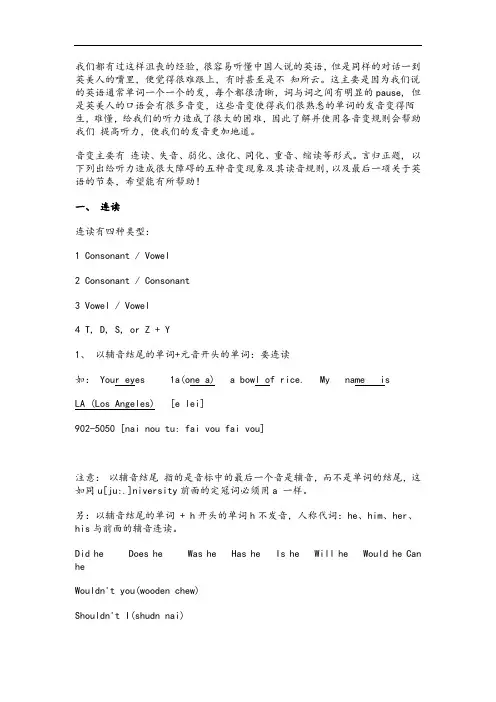
我们都有过这样沮丧的经验,很容易听懂中国人说的英语,但是同样的对话一到英美人的嘴里,便觉得很难跟上,有时甚至是不知所云。
这主要是因为我们说的英语通常单词一个一个的发,每个都很清晰,词与词之间有明显的pause, 但是英美人的口语会有很多音变,这些音变使得我们很熟悉的单词的发音变得陌生,难懂,给我们的听力造成了很大的困难,因此了解并使用各音变规则会帮助我们提高听力,使我们的发音更加地道。
音变主要有连读、失音、弱化、浊化、同化、重音、缩读等形式。
言归正题, 以下列出给听力造成很大障碍的五种音变现象及其读音规则,以及最后一项关于英语的节奏,希望能有所帮助!一、连读连读有四种类型:1 Consonant / Vowel2 Consonant / Consonant3 Vowel / Vowel4 T, D, S, or Z + Y1、以辅音结尾的单词+元音开头的单词:要连读如: Your eyes 1a(one a) a bowl of rice. My name isLA (Los Angeles) [e lei]902-5050 [nai nou tu: fai vou fai vou]注意:以辅音结尾指的是音标中的最后一个音是辅音,而不是单词的结尾,这如同u[ju:.]niversity前面的定冠词必须用a 一样。
另:以辅音结尾的单词 + h开头的单词h不发音,人称代词:he、him、her、his与前面的辅音连读。
Did he Does he Was he Has he Is he Will he Would he Can heWouldn't you(wooden chew)Shouldn't I(shudn nai)Won't he (won knee)Didn't he(didn knee)Hasn't he(haz a knee)Wouldn't he(wooden knee)Isn't he(is a knee)Isn't it (is a nit)Doesn't it(duza nit)Aren't I(are nai)Won't you(won chew)Don't you(don chew)Can't you(can chew)Could you(ku dʒ u:)Would you(wu d3ju)Tell him to ask her….Leave him For himGive her a book. Giv-er a book. Tell him to ask her. Tell-im to ask-er. What will he do What will-i do Where will he go Where will-i go When will he come When will-i comewho will he meet who will-i meet How will he know How will-i knowHas he gone Has-i goneHad he done it before Had-i done it beforeMust he go Must-i goCan he do it Can-i do itShould he leave Should-i leave2、辅音+辅音的连读如果前面的单词结尾的清辅音,后面单词开头是与之相对应的浊辅音,或者相反,只发后面的辅音t-d tʃ-dʒ s-z ʃ -ʒ p-b f-v k-gsi t down I don’t know(发音再次的老师都不会发出 [t] 音)I jus t didn't ge t the chance.Bi g cake Da d tol d me Hu ge change Goo d night3、元音+元音当前面的单词以元音结尾,后面的单词以元音开头,两个元音连读,连读的方法是在中间加w或者加j.以ou结尾的元音后面一般加w。
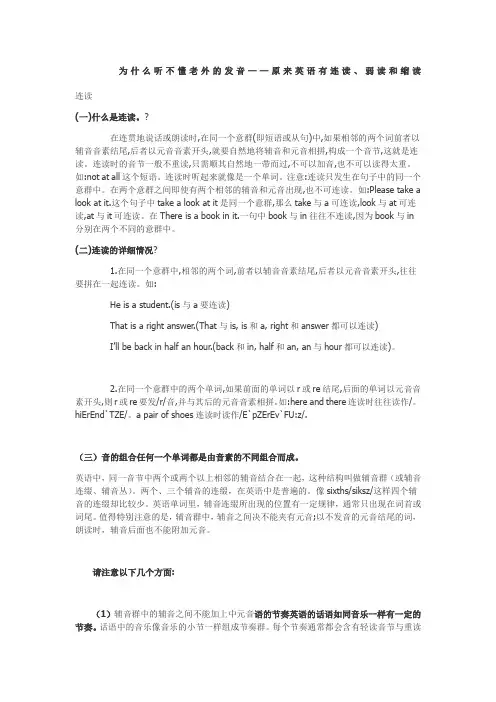
为什么听不懂老外的发音——原来英语有连读、弱读和缩读连读(一)什么是连读。
?在连贯地说话或朗读时,在同一个意群(即短语或从句)中,如果相邻的两个词前者以辅音音素结尾,后者以元音音素开头,就要自然地将辅音和元音相拼,构成一个音节,这就是连读。
连读时的音节一般不重读,只需顺其自然地一带而过,不可以加音,也不可以读得太重。
如:not at all这个短语。
连读时听起来就像是一个单词。
注意:连读只发生在句子中的同一个意群中。
在两个意群之间即使有两个相邻的辅音和元音出现,也不可连读。
如:Please take a look at it.这个句子中take a look at it是同一个意群,那么take与a可连读,look与at可连读,at与it可连读。
在There is a book in it.一句中book与in往往不连读,因为book与in 分别在两个不同的意群中。
(二)连读的详细情况?1.在同一个意群中,相邻的两个词,前者以辅音音素结尾,后者以元音音素开头,往往要拼在一起连读。
如:He is a student.(is与a要连读)That is a right answer.(That与is, is和a, right和answer都可以连读)I’ll be back in half an hour.(back和in, half和an, an与hour都可以连读)。
2.在同一个意群中的两个单词,如果前面的单词以r或re结尾,后面的单词以元音音素开头,则r或re要发/r/音,并与其后的元音音素相拼。
如:here and there连读时往往读作/。
hiErEnd`TZE/。
a pair of shoes连读时读作/E`pZErEv`FU:z/.(三)音的组合任何一个单词都是由音素的不同组合而成。
英语中,同一音节中两个或两个以上相邻的辅音结合在一起,这种结构叫做辅音群(或辅音连缀、辅音丛)。
两个、三个辅音的连缀,在英语中是普遍的。

英语中的变音现象我们都有过这样沮丧的经验,很容易听懂中国人说的英语,但是同样的对话一到英美人的嘴里,便觉得很难跟上,有时甚至是不知所云。
这主要是因为我们说的英语通常单词一个一个的发,每个都很清晰,词与词之间有明显的pause, 但是英美人的口语会有很多音变,这些音变使得我们很熟悉的单词的发音变得陌生,难懂,给我们的听力造成了很大的困难,因此了解并使用各音变规则会帮助我们提高听力,使我们的发音更加地道。
音变主要有连读、失音、弱化、浊化、同化、重音、缩读等形式。
以下列出给听力造成很大障碍的五种音变现象及其读音规则,以及最后一项关于英语的节奏。
一、连读(见另一专题)二、失音由于失去爆破是失音的一种现象,摩擦音也会被失去,所以统称为失音。
注意:爆破音并不是完全失去,仍然形成阻碍,把气流堵在里面,但不爆破,直接发出相邻的辅音。
(见失去爆破专题)Disappearing /T/关于/t/失音问题:The sound /t/ tends to be unstable in many words and phrases. Sometimes it's there. Sometimes it isn't. There is a process called elision which deletes /t/ when it is preceded by a voiceless consonant and followed by any consonant except /h/. Here are some examples: Christmas, last week, most people, act sensibly, software.Disappearing /d/We saw that /t/ can disappear in certain circumstances. The same is true of /d/, but the circumstances are slightly different. If /d/ is preceded by a voiced consonant /b d g v z m n l/ and it is followed by a consonant other than /h/, then it can be deleted (elided). Here are some examples: handbag, old man, used toTaken together, the disappearance of /t/ and /d/ is called alveolar plosive elision (齿龈爆破失音).三、浊化1、[S] 后面的清辅音要浊化[k] 浊化成[g] sky discussion:[t] 浊化成[d] stand[p]浊化成[b] speak expression还有[tr]-[dr] strike2、美音中t在单词的中间被浊化成[d]如:writer,听起来和rider 的发音几乎没有区别letter-ladder out of2-1在单词的前面或后面就不浊化比如:Ted took ten tomatoes. first, coast, hot, late, fat, goat, hit, put, not, hurt,等。

英语的发音技巧和连读规则A. 美语发音的特点1)腹式发音听美音质特别浑厚,听起来共鸣时间很长,甚至带有很浓重的鼻音.所谓的腹式发音,指的是美式发音讲究的腹腔发声习惯,这和我们汉语遵循的胸腔发声的习惯大大相径庭。
如果想练习最纯正地道的美语,一定要习惯养成腹腔发声的习惯,做到用发音器官的后部发音。
2)字面发音一般单词怎么拼写就怎么发音,发音更具规则性。
比如卷舌音[r]的处理,在美语中只要有字母r,发音的时候就要卷舌;反之,没有字母r,发音就不要卷舌!3)强弱分明在美语中重读和弱读。
美语的节奏是有重读和弱读交替而产生的(the alternation of stressed and unstressed syllables),所以如果我们如果想让自己的话说出来有节奏感,就要重读该重读的音节,弱读该弱读的地方,这就强弱分明的原则.单词的重音也要注意,我们首先不能随便移动单词的重音,其次要弱读没有重音的音节,最忌把每个音节上,可是我们习惯上会重读第二个音节,这就是习惯的不同,必须纠正。
B。
英音发音的特点1、美音的共振焦点(resonance focus),也就是肌肉运动最多的地方,在口腔中后部的舌与腭之间,也就是所谓的“发音靠后”;英音的共振焦点在牙齿前面、嘴唇之间,嘴唇和面部肌肉运动得更多,也就是所谓的“发音靠前”。
2 、美音的音调只在音节之间变化,而不在音节之内变化.音节之内没有音高的滑动(pitch glide);英音则通过音高的滑动来用于强调逻辑上重要的词语.所谓音高滑动,是指拉长音节并升高音调。
3 、有3个主要元音在英音中总是不同。
/o/在美音中是两段式发音,/??/而在英音中前面加上了一个/?/的音,变成了三段式。
英音的/?/短促有力,嘴唇快速滑动,口形变小。
英音的/?:/发音时,双唇要前伸很远,并弯成圆形,只留下很小的开口.4 、有一些音在英音中只是有时不同。
/i:/在单词结尾(尤其是拼写作y或ly)时弱化为/i/,例如pretty、mostly。
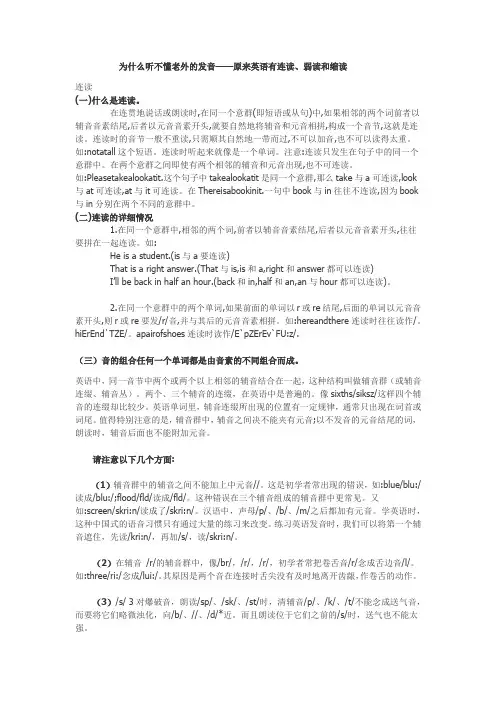
为什么听不懂老外的发音——原来英语有连读、弱读和缩读连读(一)什么是连读。
在连贯地说话或朗读时,在同一个意群(即短语或从句)中,如果相邻的两个词前者以辅音音素结尾,后者以元音音素开头,就要自然地将辅音和元音相拼,构成一个音节,这就是连读。
连读时的音节一般不重读,只需顺其自然地一带而过,不可以加音,也不可以读得太重。
如:notatall这个短语。
连读时听起来就像是一个单词。
注意:连读只发生在句子中的同一个意群中。
在两个意群之间即使有两个相邻的辅音和元音出现,也不可连读。
如:Pleasetakealookatit.这个句子中takealookatit是同一个意群,那么take与a可连读,look 与at可连读,at与it可连读。
在Thereisabookinit.一句中book与in往往不连读,因为book 与in分别在两个不同的意群中。
(二)连读的详细情况1.在同一个意群中,相邻的两个词,前者以辅音音素结尾,后者以元音音素开头,往往要拼在一起连读。
如:He is a student.(is与a要连读)That is a right answer.(That与is,is和a,right和answer都可以连读)I’ll be back in half an hour.(back和in,half和an,an与hour都可以连读)。
2.在同一个意群中的两个单词,如果前面的单词以r或re结尾,后面的单词以元音音素开头,则r或re要发/r/音,并与其后的元音音素相拼。
如:hereandthere连读时往往读作/。
hiErEnd`TZE/。
apairofshoes连读时读作/E`pZErEv`FU:z/.(三)音的组合任何一个单词都是由音素的不同组合而成。
英语中,同一音节中两个或两个以上相邻的辅音结合在一起,这种结构叫做辅音群(或辅音连缀、辅音丛)。
两个、三个辅音的连缀,在英语中是普遍的。
像sixths/siksz/这样四个辅音的连缀却比较少。
初中英语语音技巧大全英语是全球通用的语言之一,掌握好英语语音技巧对于初中生来说非常重要。
良好的语音技巧不仅能够提高口语表达能力,还能提升听力理解和交流能力。
本文将为大家总结一些初中英语语音技巧,帮助大家在英语学习中更加流利自如。
1. 发音准确准确的发音是学习英语的基础,也是培养良好语感的关键。
初中阶段,我们需要特别注意英语中的元音和辅音的发音规则。
例如,要注意长短元音的区别,如/i:/和/ɪ/的区别,/æ/和/ə/的区别等。
同时,要正确发音英语中的浊音辅音和清音辅音,如/b/和/p/的区别,/v/和/f/的区别等。
通过反复练习和模仿,逐渐熟悉和掌握这些发音规则。
2. 重音与节奏在英语中,重音和节奏是非常重要的语音技巧。
正确的重音和节奏可以让我们的口语更有节奏感,也更容易被英语母语人士理解。
对于多音节单词,我们要注意找到正确的重音位置,并用适当的重音强调单词的重要部分。
此外,英语中的连读和缩读现象也需要我们掌握。
连读指的是当一个词尾以辅音结尾,而下一个词开头以元音开头时,两个词之间会发生音变。
缩读则是指一些常见的短语或固定搭配,在快速口语中会发生音变,如gonna代表going to,wanna代表want to等。
3. 语调和降调语调是指语言中的声调变化,对于表达意思和情感起着重要作用。
在英语中,升调表示疑问,降调表示陈述。
因此,在表达疑问句时,我们要注意提高句子末尾的声调。
此外,在英语口语中,语调的变化还可以用来表达感情,例如高兴、惊讶或悲伤等。
熟悉和掌握英语的语调规律,可以提升口语表达的自然度和流利度。
4. 连音现象英语中的连音现象十分普遍,特别是在快速的口语中。
这些连音现象包括:schwa音、连写音、连续音等。
其中,最常见的是schwa音,它是英语中的中央元音,发音模糊,常用来代替一些辅音组合。
例如,在单词"family"中,最后的元音/a/就发成了schwa音。
大学弱读规则与技巧
对于大多数同学,弱读是一个很陌生的概念,因为我们的英语老师很少讲这个知识,所以大家说英语时几乎对每个英语单词都采用的了强读形式。
可是真正说英语时全部都是强读,则整个句子必然没有节奏,没有婉转的感觉,枯燥无味。
弱读的一半规则:元音一次弱化之后主要是变为X,二次弱化后这个音就消失了,辅音弱化后也消失了。
我们读英语时每当碰到and时,一般都会读作and,殊不知,在美语口语里面,and通常只需弱读为en,甚至是一个简单的鼻音n。
当说话者需要强调时则会把and读作and。
如果能够掌握好这个发音规则,我们的口语将更加流畅,听力理解也更加畅听无阻。
大部分的缩读情况可以理解为弱读加连读。
如果能够灵活运用弱读和缩读的话,那么你的口语又会更上一层楼了。
英语口语口音发音技巧口语口音在英语学习中扮演着重要角色。
通过正确、清晰的发音,我们可以更好地交流和理解他人。
下面将介绍一些提升英语口语口音的技巧,帮助你更加自信地表达自己。
1. 模仿母语者的口音和语调要学习一门语言的正宗口音,最好的方法之一是模仿母语者的发音和语调。
可以通过在语音课程中听母语者的录音、观看电影或纪录片,还可以找到一位外教朋友并与他们练习口语交流。
通过听与模仿母语者的口音,可以提高自己的语音感知和发音准确度。
2. 注重练习元音和辅音的发音英语中有许多种不同的元音和辅音,而每种元音和辅音的发音方式也有所不同。
因此,对于每个音标,我们需要学会正确的嘴部形状和舌头位置。
首先,可以通过练习单词的发音来熟悉每个音标的发音方式。
同时,还可以尝试使用音标字母来标注单词的发音,以便更准确地掌握发音。
3. 注重语音语调的准确性除了单词的发音,语音语调也是英语口语的重要组成部分。
语音语调主要包括重音、音调以及连读和缩读等。
正确使用重音能够帮助我们强调句中的关键信息,更具有表达力。
此外,学会正确使用上升和下降音调,可以让我们的语言更加有节奏感和流畅度。
另外,连读和缩读也是英语口语中常见的现象,掌握这些技巧可以让我们更自然地表达自己。
4. 多听多模仿,做口语练习“多听多模仿”是提高口语口音的重要方法。
可以多听英语电台、播客、纪录片等,尽量选择母语者的录音,锻炼自己的听力和口语表达能力。
在模仿他人口音的过程中,可以逐渐形成自己的语音风格,提升英语口语流利度。
同时,进行口语练习也是非常有必要的。
可以找到一个学习伙伴,每天进行口语练习。
也可以参加英语角、口语俱乐部等活动,与其他学习者交流和练习口语。
通过大量的口语练习,能够帮助我们熟悉口音和准确地发音。
5. 注重发音细节准确的发音还需要我们注重一些细节。
例如,注意舌头的位置和双唇的运动,尤其是对于一些特殊发音,如“th”音、“r”音等。
此外,在练习时要注意语速和语调的抑扬顿挫,模仿母语者的自然语音。
美式英语中的连读、略读、同化、不完全爆破同化同化是两个音相互作用,导致最后产生另外一个音的现象,这样可以使句子显得更流畅。
1./s/+/j/→/ʃ/ 如:this year等(1)I guess you’re right. 我想你是对的。
(2)I miss you. 我想念你。
2./z/+/j/→/ʒ/(1)What brings you here? 什么风把你刮到这儿来了?(2)I’m not gonna lose you again.3./t/+/j/→/ʧ/ 如:congratulation、last year等(1) Nice to meet you.很高兴见到你。
(第二次见面就说Nice to see you.)(2) What you doing? 你在做什么?4./d/+/j/→/ʤ/ 如:education等(1)Pinned ya. 压在你身上了。
(《狮子王》中的一句台词,听起来是/ˈpinʤə/。
这两个单词包含的发音规则有弱读+同化。
)(2)How did you like it? 你觉得怎样?连读在正常英语口语中,连读现象比比皆是。
有些较短的句子听起来简直就像一个单词,所以学好连读是通向流利英语必经之路。
1.词尾辅音+词首元音这种连读最常见也最简单,把相邻的两个单词想象成一个单词即可。
(1) I’m so fed up with him. 他让我烦透了。
(2) I’ve already made up my mind. 我意已决。
(3) That is so gross [ɡrəus].太俗了。
(4) Turn on the juice. 合上开关,恢复通电。
(juice也有电的意思)2.词尾元音+词首元音A:以/u/、/ʊ/、/au/、/o/结尾的单词与跟在后面的元音连读时,两个元音之间加上一个较轻的/w/,这样过渡就会很自然。
(1) Just do it. 尽管去做吧!(2) It’s snowing. 下雪了。
英语的发音技巧和连读规则A.美语发音的特点1)腹式发音听美音质特别浑厚,听起来共鸣时间很长,甚至带有很浓重的鼻音。
所谓的腹式发音,指的是美式发音讲究的腹腔发声习惯,这和我们汉语遵循的胸腔发声的习惯大大相径庭。
如果想练习最纯正地道的美语,一定要习惯养成腹腔发声的习惯,做到用发音器官的后部发音。
2)字面发音一般单词怎么拼写就怎么发音,发音更具规则性。
比如卷舌音[r]的处理,在美语中只要有字母r,发音的时候就要卷舌;反之,没有字母r,发音就不要卷舌!3)强弱分明在美语中重读和弱读。
美语的节奏是有重读和弱读交替而产生的(the alternation of stressed and unstressed syllables),所以如果我们如果想让自己的话说出来有节奏感,就要重读该重读的音节,弱读该弱读的地方,这就强弱分明的原则。
单词的重音也要注意,我们首先不能随便移动单词的重音,其次要弱读没有重音的音节,最忌把每个音节上,可是我们习惯上会重读第二个音节,这就是习惯的不同,必须纠正。
B.英音发音的特点1、美音的共振焦点(resonance focus),也就是肌肉运动最多的地方,在口腔中后部的舌与腭之间,也就是所谓的“发音靠后”;英音的共振焦点在牙齿前面、嘴唇之间,嘴唇和面部肌肉运动得更多,也就是所谓的“发音靠前”。
2、美音的音调只在音节之间变化,而不在音节之内变化。
音节之内没有音高的滑动(pitch glide);英音则通过音高的滑动来用于强调逻辑上重要的词语。
所谓音高滑动,是指拉长音节并升高音调。
3、有3个主要元音在英音中总是不同。
/o/在美音中是两段式发音,/??/而在英音中前面加上了一个/?/的音,变成了三段式。
英音的/?/短促有力,嘴唇快速滑动,口形变小。
英音的/?:/发音时,双唇要前伸很远,并弯成圆形,只留下很小的开口。
4、有一些音在英音中只是有时不同。
/i:/在单词结尾(尤其是拼写作y或ly)时弱化为/i/,例如pretty、mostly。
能告诉我下面几个英语口语中缩读词的读法?也就是等号后面的该发什么音?如果不能用音标表示的话就用发音相近的汉语拼音或汉字代替好了,谢谢!did you have a = d'jyavahe would have = he'd'veWhat have you = What'chawhat do you - or - what are you = whatchu问题补充:这些缩读形式是我从一个外国网站上看到的,也不知道准不准确。
各位的回答还是让我搞不大明白到底发什么音,唉!要是能用音标表示就好了。
d'jyavaDI JIA HA VA he'd'veHE DAVE(这个A的读音是A在闭音节里的发音)What'chaWHA CHA UwhatchuWHA 秋英语常见缩读(2009-05-31 12:16:10)转载▼A.缩读Standard Commoncontraction Example Noteand ’n Do you know Nancy ‘n David.are ’r My classmates ‘r on vacation.Are you Ya Ya going to school? Where ya going?because ’cause(*)/coz I don’t like her‘causeshe is too proud. can C’n I c’n be there in an hour.come c’m C’m over to our housearound 10:00.could could’a You could’a hurt yourself!havecould not couldn’a He couldn’a done it.havedoes she dushi Dushi speak English? don’t know dunno(*) I dunno where you live.forferHe works fer his father.give megimme(*)Gimme that.going togonna(*)GonnuI’m gonna give him a present.I’m gonnu inv ite her to the party.goodbyeG’byeI’ll talk to you tomorrow. G’bye!got togotta(*)gottu(*)I gotta give him a present.I gottu invite her to my birthday party.had betterbetterYou better start off right now.have tohaftaI hafta go home immediately.he’eWho is ’e?he/she hashe/she’asHe’as a house at the beach.her’erThis is’er book.him’imI like ‘im very much.his’isWhat is ‘is name?This does not apply if his begins a sentence. how did youhow ’dya/How ‘djaHow ‘dya/How ‘dja make that?how do youhow’ dy ’aHow ‘dy ‘a do it?how doeshow’sHow’s she feel today?in front ofin fronnaHe parked in fronna the garden.-ing-in(*)I’m goin’ to the store.is thatizatIzat your new car?ofa or o’(*)He’s sorta strange.It’s made o’gold.oldol(*)There’s the ol’ house.or’rDo you like ice cream’r candy? out ofoutta(*)(pronounced: oudda)Get outta the class at once!probablyprob’ly(*)He’ll prob’ly come for dinner.should not haveshouldn’aYou shouldn’a leave so soon.someS’mI want s’m apples.suresherSher, I like chocolate!Athem’m/’em(*)I like’m/I like’em.totaI don’t know what ta d o now.want towanna(*)wannuI wanna go outside.I wanna eat something.I wannu avoid the subject.what are youWachya or wachaWachya/Wacha doin?what doeswhat’s(*)What’s her do for a living?what is thewhat‟s aWhat‟s a m atter?ALSO:Wassa matta?(*)would not havewudn‟aI wudn‟a done that if I were you.why did youWhyd‟ya or whydjaWhy‟dya/ why‟dja tell him to leave?why do youwhy‟dy‟aWhy‟dy‟a work so hard?中高口听力四类常见缩写(2009-05-31 12:18:17)转载▼分类:英语标签:英语教育杂谈1、拿掉所有元音Eg. market--------mktstandard------stdmessage------msgreceive-------rcv2、保留开头几个字母Eg. Information-----infoInsurance------InsExchange-----exchIndividual-----indiv3、保留开头和结尾Eg. Week-----wkNeed----- ndMeet------mtRoom-----rm4、根据发音Eg. Are-------rThough---thoThrough---thru下面是关于美语口语与听力当中一些基础知识的总结:一、语音外国人说英语与中国人说汉语运气的方式与位置不一样。
外国人说英语很有力道,气一般都提起来了,大致在胸腔附近。
而中国人说汉语则很少提气,把气一般都放在腹腔以下,所以感觉外国人说话声音相对很饱满,有种用“美声”说话的感觉,而中国人则不然。
这点是大家在说英语时应特别感受和注意的。
1.易混音:[i:]——[i] 长音发得不够长,短音发得不够短。
如:ship sheep;shit sheet [æ]——[e] 嘴形大小不到位。
如:pat pet;bad bed[e]——[ai];[ɔ][ɔ:]——[au] 单元音发得不够短,双元音发得不够饱满。
如:press price;smell smile;sauce south[iә]——[eә] 容易发音不清楚,将其区别弱化或忽略。
如:really rarely;beer bear [w]——[v] 嘴形不到位。
如:wave; vovel; very well[r]——[ʒ] 容易与汉语拼音混淆。
如:garage;mirror;measure[s]——[q];[z]——[ð] 注意舌头的具体位置,多加练习。
建议:大家在语音练习过程当中尽量将音标发得饱满和夸张,这样在真正用英语进行对话的时候不会由于紧张导致说出的英语含混不清,让人听不懂。
2.发音规律:1)听力中的元音[æ]。
试比较bar和bath的区别。
Bar中由于有“r”因而有卷舌音,读成[ar],bath 中“a”在“th”前(在f、n、s之前也有这种用法),通常读作[æ]。
许多人在发音的时候经常由于嘴形做不大而导致发音不标准,说出来的英语也不尽人意。
很明显,[a:]在美音中常演变成[ar]、[æ]两个音。
例:[ar]: far dark march hard mark start park[æ]: last fast master glass class can‟t2) 听力中的元音长短问题。
试比较beach和bitch的区别。
前者中[i:]和后者中的[i]是很多人经常读错的,除此之外还有[u:]和[u]的区别,如说“我吃饱了”:“I‟m full”,别不小心读成了“I‟m fool”(我是个蠢货)。
例:sheet shit;leave live;seat sit;leap lip;pull pool3) 音标[ɔ]在语音中的变化。
试比较court和caught的发音。
二者的音标均为[kɔ:t],而在口语中前者的“our”常读作[ɔr:],而后者中的“au”则读作[ɔa:],即在发[ɔ]音时向[a]过度。
例:[ɔr:]: door more foor nor[ɔa:]: bought all ball dawn(与down区别)4) 元音[ʌ]在口语中的变化。
通常在口语中有“O”字母发[ɔ]的单词常被发作[ʌ]音。
例:box fox bottle god job当然也有一些是例外的,例如:boss dog lost5) 美音中辅音与汉语拼音中声母的比较。
在英语中有[b][p][m]等,汉语中也有。
英语中叫辅音,而汉语中叫声母。
汉语声母后面总是有韵母出现,所以从来没有声母单独发音的情况。
可是英语辅音是压迫出声的,气流冲破感要强得多,如果我们仍用发声母的习惯去发英语辅音,那么会有“波”“泼”“摸”之类的音出现,cat会发成“凯特”,book会发成“布克”等等。
这就是明显的中式英语,所以应特别注意英语辅音中发音时的气流冲破感。
6)美音中的“r”字母——卷舌的标志一般而言美音中除了Mrs中的s不卷舌以外,只要含字母r的单词均需要卷舌,而英音中则可以不卷舌。
这有些类似于汉语中的儿化音。
要特别注意的是英语中的r和汉语中的r 是不一样的。
如不能把“rose”读成“肉丝”,把“road”读成“肉的”。
例:red read fire warm yesterday wrap worry etc.当然话说回来这种卷舌现象是很严格的,不含r的单词中是一定不能出现卷舌的(英音美音都一样)。